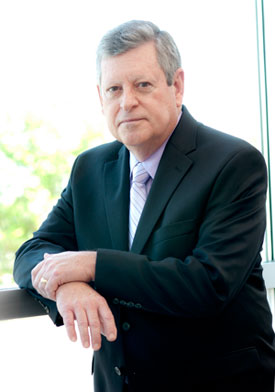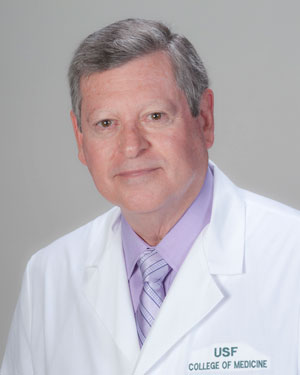Harvard trauma surgeon comes home to USF to jumpstart new partnership
Hours of sheer boredom … mixed with moments of sheer terror.
That’s how trauma surgeon Jim Hurst describes how he began his career, as a ship’s surgeon.
On both the USS Saratoga and the USS Forrestal, Dr. Hurst was the only surgeon on board. He had to be ready to handle any medical emergency for a crew of nearly 3,000 – from a routine case of appendicitis to a plane crash on the flight deck.
“It’s a pressure cooker,” Dr. Hurst said. “You mature rather quickly.”

Dr. James Hurst
But that early training has served Dr. Hurst well.
After a career that has included an earlier stint at USF, work in Cincinnati and, most recently, as part of the faculty at Harvard Medical School, Dr. Hurst has returned to Florida.
He was named the chief trauma medical director of the USF/HCA Trauma Network and a USF professor of surgery. USF and HCA joined forces in November to announce their new partnership. The joint initiative will enable five HCA hospitals in underserved areas to provide trauma care.
“The ability to attract Dr Hurst is a great example of USF Health’s move to national prominence,” said Dr. Stephen Klasko, dean of the USF College of Medicine and CEO of USF Health. “By expanding our trauma program with HCA, and along with Tampa General Hospital, accounting for one of the largest trauma programs in the country, we can now analyze outcomes throughout the state and improve trauma care for all of Florida’s citizens.”
Dr. David Smith, USF’s chair of surgery, said Dr. Hurst brings an impressive skill set to Tampa.
“Jim Hurst is an extremely well-known trauma surgeon,” Dr. Smith said. “He has superb clinical and communications skills, he was here before, and he will be a huge attribute to this program. He’s uniquely qualified to run the USF / HCA Trauma Network.”
Dr. Hurst was on the faculty at USF from 1991 to 1995. Back then, he was recruited away from Tampa to go to the University of Cincinnati as vice chair of clinical operations for the department of surgery. He then became chief of staff of The University Hospital and, eventually, the executive director/CEO of the hospital. Dr. Hurst held that post for three years before stepping down to rebuild his clinical practice and focus more on research.
Most recently, Dr. Hurst has been acting chief of surgery at Beth Israel Deaconess Medical Center and a visiting professor of surgery at Harvard Medical School, where in 2007 he won a Faculty Prize for Teaching Excellence. He also is a former member of the American College of Surgeons’ trauma committee.

But now, Dr. Hurst has returned to his old stomping grounds.
“The chance to be part of building five new trauma centers in the state, and working with people I’d sort of grown up with, personally and professionally, seemed like a lot of fun,” he said.
The new trauma network will increase public safety across Florida, Dr. Hurst said. He pointed out that about 38 percent of Floridians live in an area that is not served by a trauma center.
“Those individuals who have access to a well-functioning trauma center get back to society, get back to work, get back to their families faster,” he said. “This is going to decrease morbidity and mortality.”
The new trauma network also will enable sending data from the five trauma centers to a centralized analysis center at USF Health. The enhanced research capabilities that come from research on a larger population base could lead to important public safety improvements, Dr. Hurst said. Those changes could include anything from better child safety seat design to better understanding of which surgical techniques produce the best outcomes.
“We’ll be able to produce good, solid data based on a large population,” Dr. Hurst said.
Dr. Hurst started at USF on March 1st. He is already is reaching out to some of his professional contacts around the country, seeking trauma specialists to bring to Florida. Dr. Hurst and his wife, Suzanne, are moving back to the home they lived in the first time they were in Tampa.
Story by Lisa Greene, and photos by Eric Younghans, USF Health Communications

